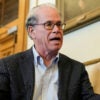Voice of America is finding itself in the news again, and not for reasons that should please the leadership of the institution. This time the spotlight has landed on VOA’s Persian News Network.
Over the years, VOA has on occasion strayed from good judgment and allowed voices on the air that have no business being represented on a U.S. government funded network. Back in the 1990s, VOA raised Congressional hackles by putting the families of Palestinian suicide bombers on the air. In 2007, another U.S. broadcasting service, Al Hurra television, came under severe criticism from Capitol Hill for airing views that actively support terrorism and for failing to challenge Arab autocratic regimes. Congress, as a consequence, withheld funding 11 million in funding for Al Hurra.
Now Voice of America’s Persian News Network (PNN) is under scrutiny by members of Congress for much the same reason. Even though the PNN has been cut to just one hour a day, that precious air time is clearly not spent as well as it should be.
According to an editorial in The Washington Times, “The Voice of America is becoming the Voice of the Islamic Republic of Iran. Recent programming choices have revealed a creeping bias toward opponents of the pro-democracy movement and de facto supporters of the regime.”
These complaints have become increasingly vocal and have reached Capitol Hill, where 69 members of Congress on March 17 sent a letter to the White House initiate an investigation of PNN.
The lawmakers cited “the apparent lack of oversight regarding the management, staffing, mission and content of VOA-PNN broadcasting.” The letter notes that the service “may have harmed the plight of those seeking human rights, rather than helping it.”
Two recent VOA broadcasts have given preferred treatment to pro-regime messages. On March 29, VOA-PNN interviewed Hooshang Amir-Ahmadi, an anti-sanctions activist who expressed the view that Iran’s belligerent posture and nuclear program are the results of the U.S. aggressive posture towards Tehran. And on April 1, VOA gave airtime to Trita Parsi, head of the National Iranian American Council (NIAC), which has received millions of dollars in federal funds to promote democracy in Iran, who was given uninterrupted airtime on a call-in show airing various anti-U.S. views. Mr. Parsi has previously been investigated by the Senate federal financial management subcommittee for misusing the federal funds received by NIAC.
It should be noted that these complaints are not new. Almost a year ago, in March 2009, a State Department inspector general substantiated charges of political bias, cronyism and lack of language skills at PNN. Little if any thing has happened to correct the situation in the meantime.
That PNN would actively advocate for the ruling regime in Iran is not the likeliest explanation for these problems. More likely, the Broadcasting Board of Governors (BBG) and the executive leadership of PNN do not want to be too controversial to the regime for fear that PNN’s signals would be blocked.
Many employees at PNN would like to give the pro-democracy movement more exposure. But when we rely less on short-wave and more on in-country medium-wave affiliates, or systems that are easily jammed, self-censorship becomes a real issue.
Furthermore, the Obama administration has dragged its feet when it came to installing new members of the BBG. For the past year, the board has been functioning at only half capacity, with board members whose three year terms had expired, and without a new chairman. This despite the fact that U.S. international broadcasting has an operating budget of $1.1 billion and is a critically important part of U.S. public diplomacy in many areas of the world. This week most of the new board was finally voted out of committee, under the chairmanship of Walter Isaacson, formerly of Time magazine and CNN.
By unanimous vote, the committee voted out Dennis Mulhaupt, Victor H. Ashe, Michael Lynton, S. Enders Wimbush and Sue McCue, the latter being Harry Reid’s former chief of staff. Two nominees are still pending: Democrat Michael Meehan, who made news while working on the campaign of Democratic Senate candidate Martha Coakley by shoving a reporter from the Weekly Standard, and former White House spokesman Republican Dana Perino, who is being held in a Democrat-Republican tit-for-tat.
Dealing with the accusations against the VOAs Persian News Network should be top on the new board’s list of things to do. Of critical importance is also formulating a long-term global strategy the preserves valuable short-wave assets of the U.S. government even as AM, FM, Internet and television become more prominent. Most important, though, should by the commitment of the board members to freedom of expression, to democracy and human right for all their listeners.
































3 Replies to “Voice of the Regime?”